Company Law: Evaluating Contractual Issues in Gareth's Event
VerifiedAdded on 2023/06/12
|7
|1642
|414
Case Study
AI Summary
This case study analyzes a company law scenario involving Gareth and his event, focusing on three key legal issues: Gareth's rights concerning the contract with Event Rental Pty Ltd after an accident, his rights regarding the contract with a singer who declined to perform due to inferior equipment, and his liability for damages to a ticket purchaser, Julie, when the event was canceled. The analysis applies legal principles such as the doctrine of frustration, breach of contract conditions and warranties, and the right to recover consideration. The study references relevant case law, including Davis Contractors Ltd v. Fareham UDC, Taylor v Caldwell, Codelfa Construction Pty Limited v SRA of New South Wales, Fibrosa Spolka Akcyjna v Fairburn Lawson Combe Barbour Ltd, Poussard v Spiers, Addis v Gramophone, Bettini v Gye and Krell v Henry, to determine the outcomes of each contractual situation. The conclusion is that the contract with Event Rental Pty Ltd was frustrated, the singer does not have the right to rescind the contract, and Julia is entitled to a refund for her ticket purchase but not further compensation.
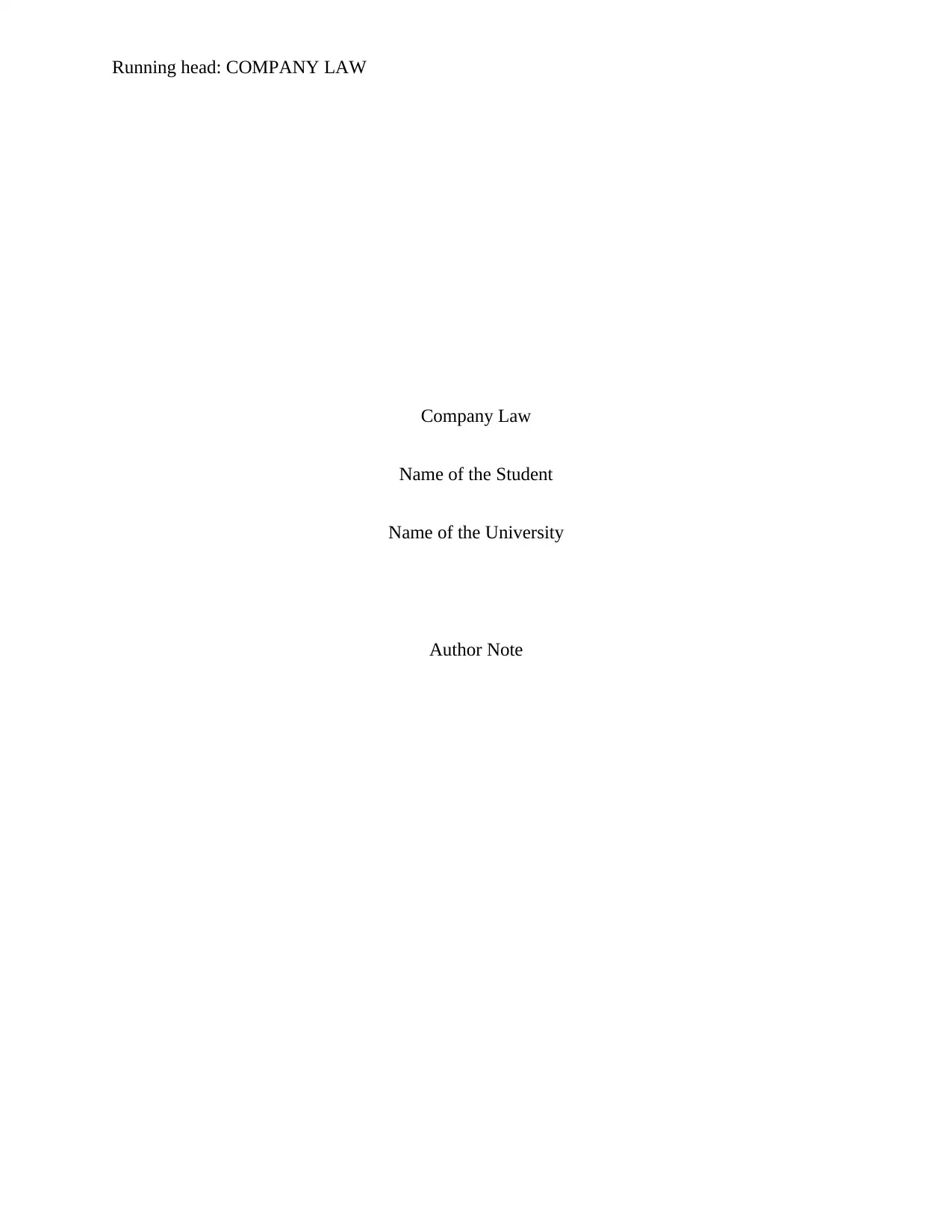
Running head: COMPANY LAW
Company Law
Name of the Student
Name of the University
Author Note
Company Law
Name of the Student
Name of the University
Author Note
Paraphrase This Document
Need a fresh take? Get an instant paraphrase of this document with our AI Paraphraser
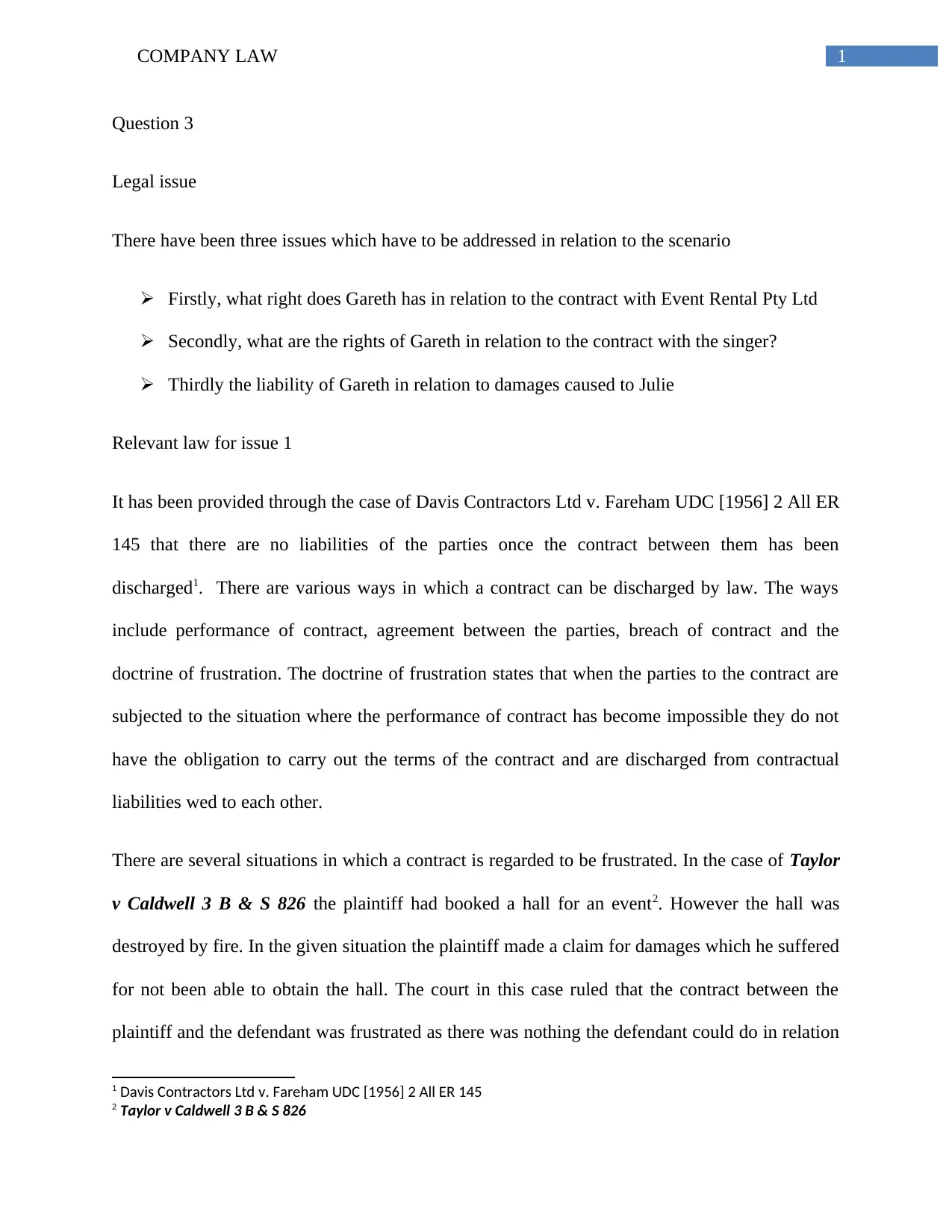
1COMPANY LAW
Question 3
Legal issue
There have been three issues which have to be addressed in relation to the scenario
Firstly, what right does Gareth has in relation to the contract with Event Rental Pty Ltd
Secondly, what are the rights of Gareth in relation to the contract with the singer?
Thirdly the liability of Gareth in relation to damages caused to Julie
Relevant law for issue 1
It has been provided through the case of Davis Contractors Ltd v. Fareham UDC [1956] 2 All ER
145 that there are no liabilities of the parties once the contract between them has been
discharged1. There are various ways in which a contract can be discharged by law. The ways
include performance of contract, agreement between the parties, breach of contract and the
doctrine of frustration. The doctrine of frustration states that when the parties to the contract are
subjected to the situation where the performance of contract has become impossible they do not
have the obligation to carry out the terms of the contract and are discharged from contractual
liabilities wed to each other.
There are several situations in which a contract is regarded to be frustrated. In the case of Taylor
v Caldwell 3 B & S 826 the plaintiff had booked a hall for an event2. However the hall was
destroyed by fire. In the given situation the plaintiff made a claim for damages which he suffered
for not been able to obtain the hall. The court in this case ruled that the contract between the
plaintiff and the defendant was frustrated as there was nothing the defendant could do in relation
1 Davis Contractors Ltd v. Fareham UDC [1956] 2 All ER 145
2 Taylor v Caldwell 3 B & S 826
Question 3
Legal issue
There have been three issues which have to be addressed in relation to the scenario
Firstly, what right does Gareth has in relation to the contract with Event Rental Pty Ltd
Secondly, what are the rights of Gareth in relation to the contract with the singer?
Thirdly the liability of Gareth in relation to damages caused to Julie
Relevant law for issue 1
It has been provided through the case of Davis Contractors Ltd v. Fareham UDC [1956] 2 All ER
145 that there are no liabilities of the parties once the contract between them has been
discharged1. There are various ways in which a contract can be discharged by law. The ways
include performance of contract, agreement between the parties, breach of contract and the
doctrine of frustration. The doctrine of frustration states that when the parties to the contract are
subjected to the situation where the performance of contract has become impossible they do not
have the obligation to carry out the terms of the contract and are discharged from contractual
liabilities wed to each other.
There are several situations in which a contract is regarded to be frustrated. In the case of Taylor
v Caldwell 3 B & S 826 the plaintiff had booked a hall for an event2. However the hall was
destroyed by fire. In the given situation the plaintiff made a claim for damages which he suffered
for not been able to obtain the hall. The court in this case ruled that the contract between the
plaintiff and the defendant was frustrated as there was nothing the defendant could do in relation
1 Davis Contractors Ltd v. Fareham UDC [1956] 2 All ER 145
2 Taylor v Caldwell 3 B & S 826
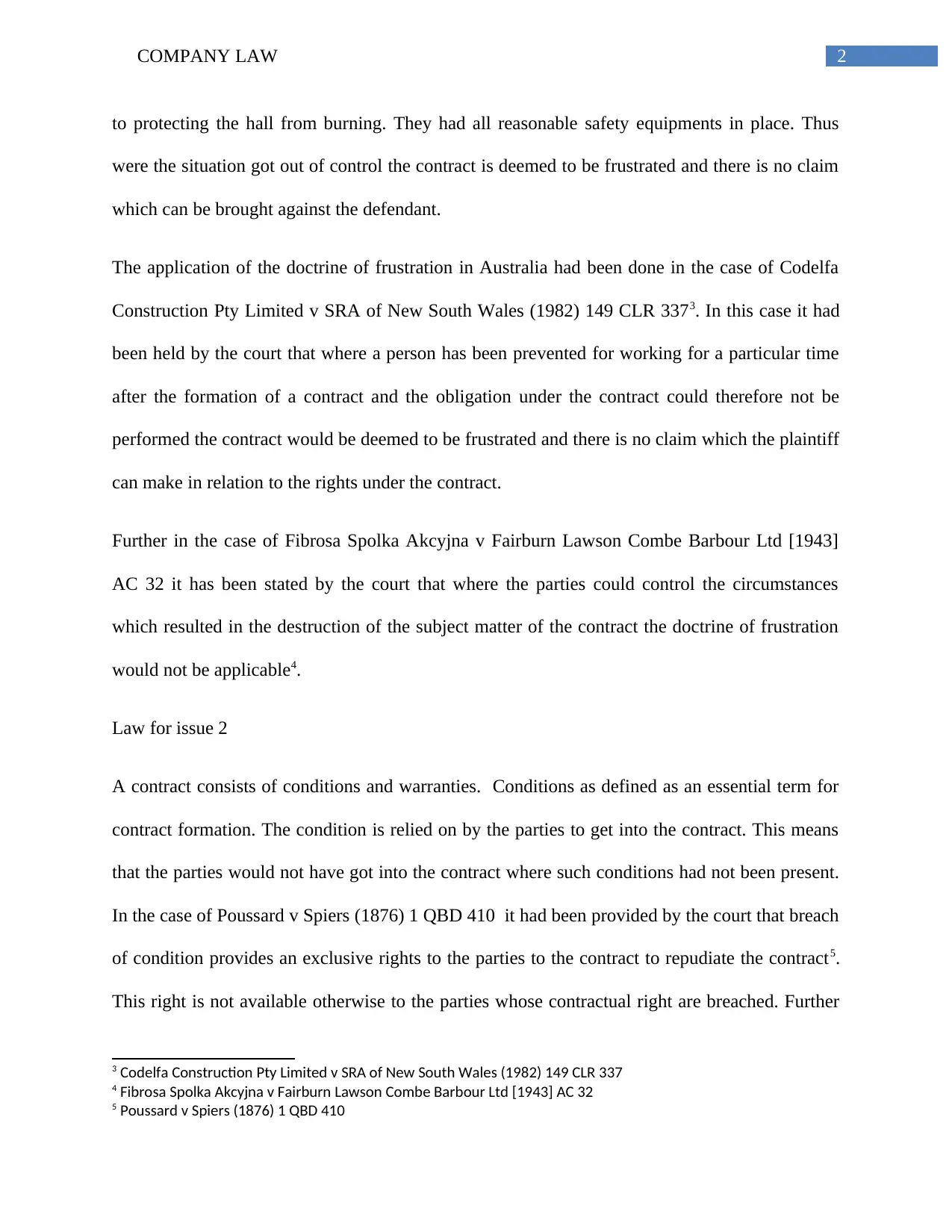
2COMPANY LAW
to protecting the hall from burning. They had all reasonable safety equipments in place. Thus
were the situation got out of control the contract is deemed to be frustrated and there is no claim
which can be brought against the defendant.
The application of the doctrine of frustration in Australia had been done in the case of Codelfa
Construction Pty Limited v SRA of New South Wales (1982) 149 CLR 3373. In this case it had
been held by the court that where a person has been prevented for working for a particular time
after the formation of a contract and the obligation under the contract could therefore not be
performed the contract would be deemed to be frustrated and there is no claim which the plaintiff
can make in relation to the rights under the contract.
Further in the case of Fibrosa Spolka Akcyjna v Fairburn Lawson Combe Barbour Ltd [1943]
AC 32 it has been stated by the court that where the parties could control the circumstances
which resulted in the destruction of the subject matter of the contract the doctrine of frustration
would not be applicable4.
Law for issue 2
A contract consists of conditions and warranties. Conditions as defined as an essential term for
contract formation. The condition is relied on by the parties to get into the contract. This means
that the parties would not have got into the contract where such conditions had not been present.
In the case of Poussard v Spiers (1876) 1 QBD 410 it had been provided by the court that breach
of condition provides an exclusive rights to the parties to the contract to repudiate the contract5.
This right is not available otherwise to the parties whose contractual right are breached. Further
3 Codelfa Construction Pty Limited v SRA of New South Wales (1982) 149 CLR 337
4 Fibrosa Spolka Akcyjna v Fairburn Lawson Combe Barbour Ltd [1943] AC 32
5 Poussard v Spiers (1876) 1 QBD 410
to protecting the hall from burning. They had all reasonable safety equipments in place. Thus
were the situation got out of control the contract is deemed to be frustrated and there is no claim
which can be brought against the defendant.
The application of the doctrine of frustration in Australia had been done in the case of Codelfa
Construction Pty Limited v SRA of New South Wales (1982) 149 CLR 3373. In this case it had
been held by the court that where a person has been prevented for working for a particular time
after the formation of a contract and the obligation under the contract could therefore not be
performed the contract would be deemed to be frustrated and there is no claim which the plaintiff
can make in relation to the rights under the contract.
Further in the case of Fibrosa Spolka Akcyjna v Fairburn Lawson Combe Barbour Ltd [1943]
AC 32 it has been stated by the court that where the parties could control the circumstances
which resulted in the destruction of the subject matter of the contract the doctrine of frustration
would not be applicable4.
Law for issue 2
A contract consists of conditions and warranties. Conditions as defined as an essential term for
contract formation. The condition is relied on by the parties to get into the contract. This means
that the parties would not have got into the contract where such conditions had not been present.
In the case of Poussard v Spiers (1876) 1 QBD 410 it had been provided by the court that breach
of condition provides an exclusive rights to the parties to the contract to repudiate the contract5.
This right is not available otherwise to the parties whose contractual right are breached. Further
3 Codelfa Construction Pty Limited v SRA of New South Wales (1982) 149 CLR 337
4 Fibrosa Spolka Akcyjna v Fairburn Lawson Combe Barbour Ltd [1943] AC 32
5 Poussard v Spiers (1876) 1 QBD 410
⊘ This is a preview!⊘
Do you want full access?
Subscribe today to unlock all pages.

Trusted by 1+ million students worldwide
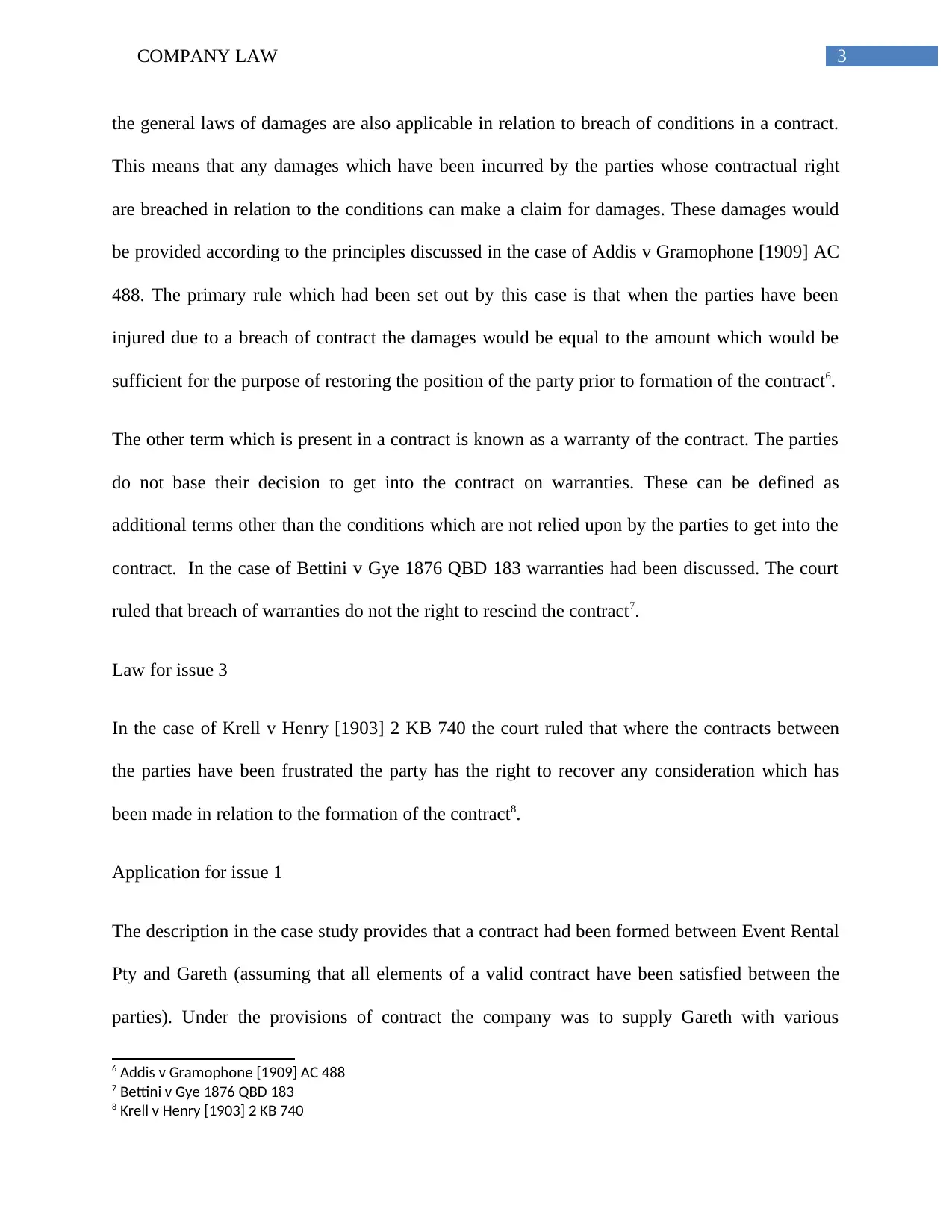
3COMPANY LAW
the general laws of damages are also applicable in relation to breach of conditions in a contract.
This means that any damages which have been incurred by the parties whose contractual right
are breached in relation to the conditions can make a claim for damages. These damages would
be provided according to the principles discussed in the case of Addis v Gramophone [1909] AC
488. The primary rule which had been set out by this case is that when the parties have been
injured due to a breach of contract the damages would be equal to the amount which would be
sufficient for the purpose of restoring the position of the party prior to formation of the contract6.
The other term which is present in a contract is known as a warranty of the contract. The parties
do not base their decision to get into the contract on warranties. These can be defined as
additional terms other than the conditions which are not relied upon by the parties to get into the
contract. In the case of Bettini v Gye 1876 QBD 183 warranties had been discussed. The court
ruled that breach of warranties do not the right to rescind the contract7.
Law for issue 3
In the case of Krell v Henry [1903] 2 KB 740 the court ruled that where the contracts between
the parties have been frustrated the party has the right to recover any consideration which has
been made in relation to the formation of the contract8.
Application for issue 1
The description in the case study provides that a contract had been formed between Event Rental
Pty and Gareth (assuming that all elements of a valid contract have been satisfied between the
parties). Under the provisions of contract the company was to supply Gareth with various
6 Addis v Gramophone [1909] AC 488
7 Bettini v Gye 1876 QBD 183
8 Krell v Henry [1903] 2 KB 740
the general laws of damages are also applicable in relation to breach of conditions in a contract.
This means that any damages which have been incurred by the parties whose contractual right
are breached in relation to the conditions can make a claim for damages. These damages would
be provided according to the principles discussed in the case of Addis v Gramophone [1909] AC
488. The primary rule which had been set out by this case is that when the parties have been
injured due to a breach of contract the damages would be equal to the amount which would be
sufficient for the purpose of restoring the position of the party prior to formation of the contract6.
The other term which is present in a contract is known as a warranty of the contract. The parties
do not base their decision to get into the contract on warranties. These can be defined as
additional terms other than the conditions which are not relied upon by the parties to get into the
contract. In the case of Bettini v Gye 1876 QBD 183 warranties had been discussed. The court
ruled that breach of warranties do not the right to rescind the contract7.
Law for issue 3
In the case of Krell v Henry [1903] 2 KB 740 the court ruled that where the contracts between
the parties have been frustrated the party has the right to recover any consideration which has
been made in relation to the formation of the contract8.
Application for issue 1
The description in the case study provides that a contract had been formed between Event Rental
Pty and Gareth (assuming that all elements of a valid contract have been satisfied between the
parties). Under the provisions of contract the company was to supply Gareth with various
6 Addis v Gramophone [1909] AC 488
7 Bettini v Gye 1876 QBD 183
8 Krell v Henry [1903] 2 KB 740
Paraphrase This Document
Need a fresh take? Get an instant paraphrase of this document with our AI Paraphraser
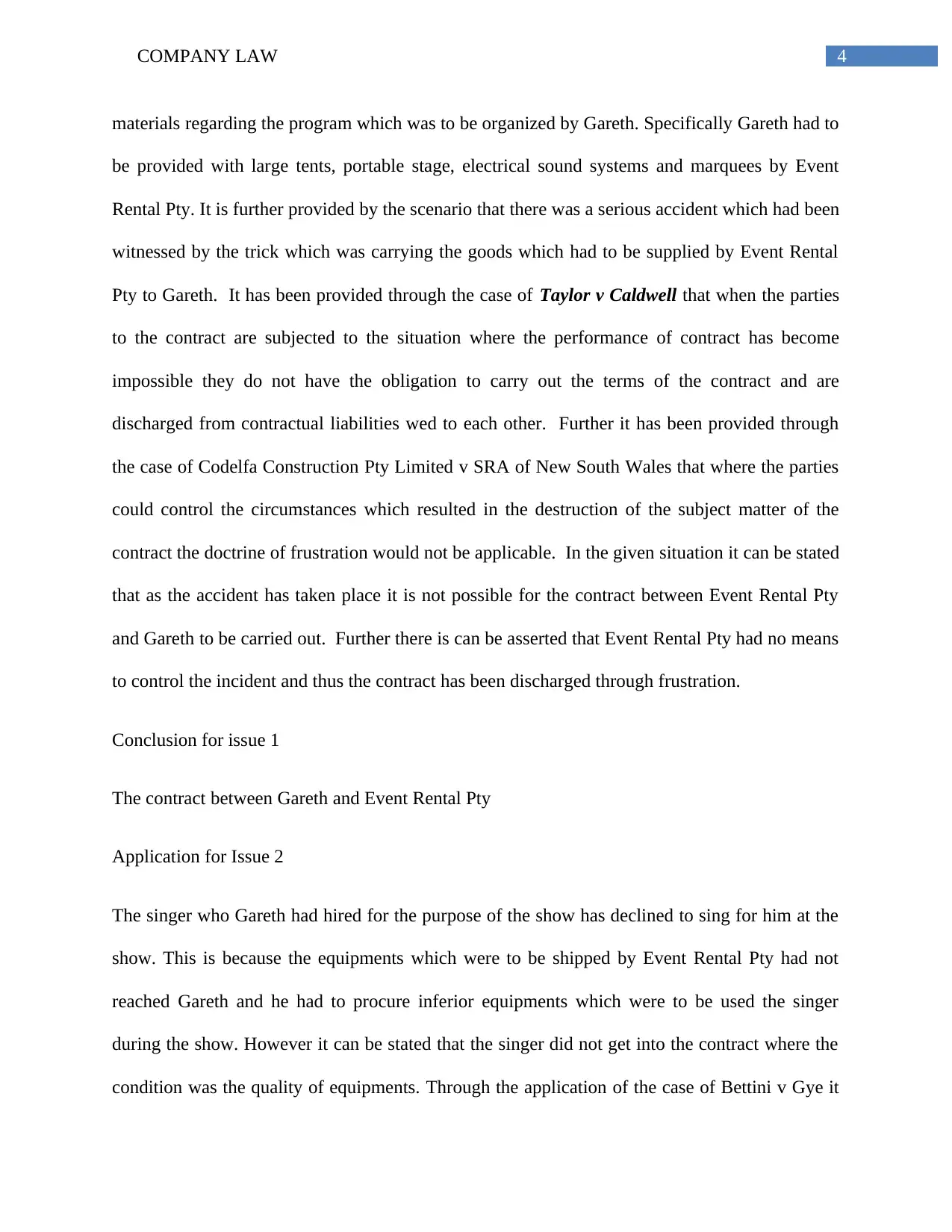
4COMPANY LAW
materials regarding the program which was to be organized by Gareth. Specifically Gareth had to
be provided with large tents, portable stage, electrical sound systems and marquees by Event
Rental Pty. It is further provided by the scenario that there was a serious accident which had been
witnessed by the trick which was carrying the goods which had to be supplied by Event Rental
Pty to Gareth. It has been provided through the case of Taylor v Caldwell that when the parties
to the contract are subjected to the situation where the performance of contract has become
impossible they do not have the obligation to carry out the terms of the contract and are
discharged from contractual liabilities wed to each other. Further it has been provided through
the case of Codelfa Construction Pty Limited v SRA of New South Wales that where the parties
could control the circumstances which resulted in the destruction of the subject matter of the
contract the doctrine of frustration would not be applicable. In the given situation it can be stated
that as the accident has taken place it is not possible for the contract between Event Rental Pty
and Gareth to be carried out. Further there is can be asserted that Event Rental Pty had no means
to control the incident and thus the contract has been discharged through frustration.
Conclusion for issue 1
The contract between Gareth and Event Rental Pty
Application for Issue 2
The singer who Gareth had hired for the purpose of the show has declined to sing for him at the
show. This is because the equipments which were to be shipped by Event Rental Pty had not
reached Gareth and he had to procure inferior equipments which were to be used the singer
during the show. However it can be stated that the singer did not get into the contract where the
condition was the quality of equipments. Through the application of the case of Bettini v Gye it
materials regarding the program which was to be organized by Gareth. Specifically Gareth had to
be provided with large tents, portable stage, electrical sound systems and marquees by Event
Rental Pty. It is further provided by the scenario that there was a serious accident which had been
witnessed by the trick which was carrying the goods which had to be supplied by Event Rental
Pty to Gareth. It has been provided through the case of Taylor v Caldwell that when the parties
to the contract are subjected to the situation where the performance of contract has become
impossible they do not have the obligation to carry out the terms of the contract and are
discharged from contractual liabilities wed to each other. Further it has been provided through
the case of Codelfa Construction Pty Limited v SRA of New South Wales that where the parties
could control the circumstances which resulted in the destruction of the subject matter of the
contract the doctrine of frustration would not be applicable. In the given situation it can be stated
that as the accident has taken place it is not possible for the contract between Event Rental Pty
and Gareth to be carried out. Further there is can be asserted that Event Rental Pty had no means
to control the incident and thus the contract has been discharged through frustration.
Conclusion for issue 1
The contract between Gareth and Event Rental Pty
Application for Issue 2
The singer who Gareth had hired for the purpose of the show has declined to sing for him at the
show. This is because the equipments which were to be shipped by Event Rental Pty had not
reached Gareth and he had to procure inferior equipments which were to be used the singer
during the show. However it can be stated that the singer did not get into the contract where the
condition was the quality of equipments. Through the application of the case of Bettini v Gye it
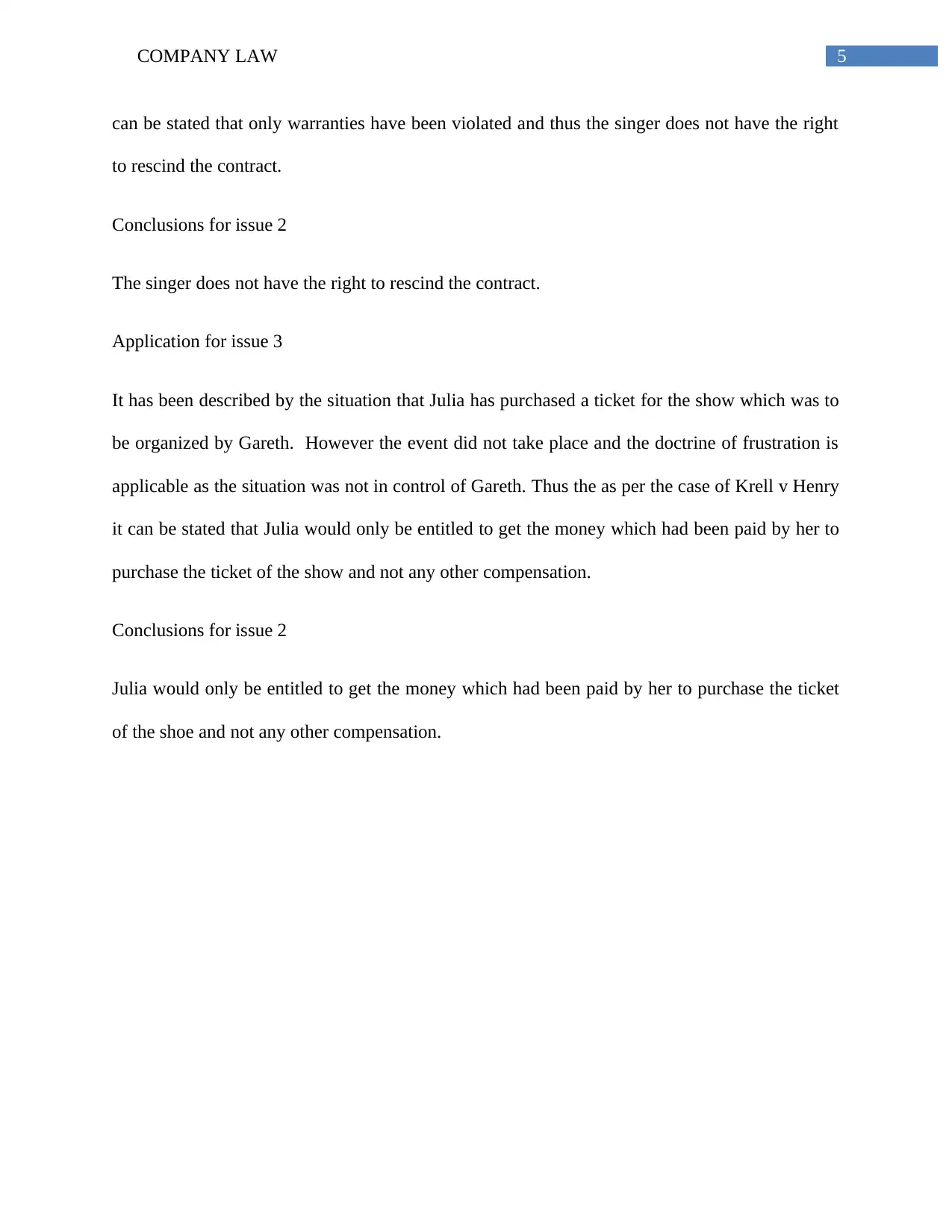
5COMPANY LAW
can be stated that only warranties have been violated and thus the singer does not have the right
to rescind the contract.
Conclusions for issue 2
The singer does not have the right to rescind the contract.
Application for issue 3
It has been described by the situation that Julia has purchased a ticket for the show which was to
be organized by Gareth. However the event did not take place and the doctrine of frustration is
applicable as the situation was not in control of Gareth. Thus the as per the case of Krell v Henry
it can be stated that Julia would only be entitled to get the money which had been paid by her to
purchase the ticket of the show and not any other compensation.
Conclusions for issue 2
Julia would only be entitled to get the money which had been paid by her to purchase the ticket
of the shoe and not any other compensation.
can be stated that only warranties have been violated and thus the singer does not have the right
to rescind the contract.
Conclusions for issue 2
The singer does not have the right to rescind the contract.
Application for issue 3
It has been described by the situation that Julia has purchased a ticket for the show which was to
be organized by Gareth. However the event did not take place and the doctrine of frustration is
applicable as the situation was not in control of Gareth. Thus the as per the case of Krell v Henry
it can be stated that Julia would only be entitled to get the money which had been paid by her to
purchase the ticket of the show and not any other compensation.
Conclusions for issue 2
Julia would only be entitled to get the money which had been paid by her to purchase the ticket
of the shoe and not any other compensation.
⊘ This is a preview!⊘
Do you want full access?
Subscribe today to unlock all pages.

Trusted by 1+ million students worldwide
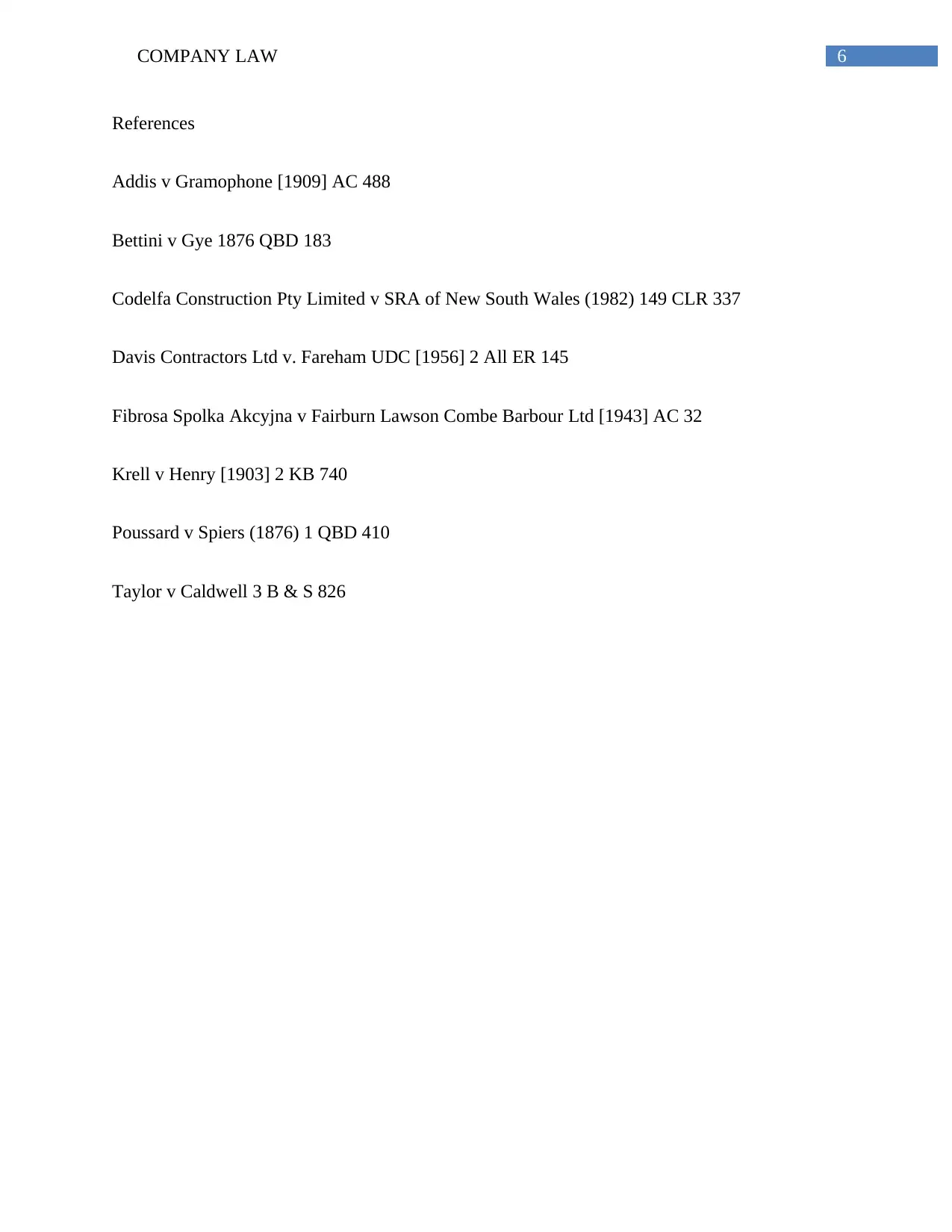
6COMPANY LAW
References
Addis v Gramophone [1909] AC 488
Bettini v Gye 1876 QBD 183
Codelfa Construction Pty Limited v SRA of New South Wales (1982) 149 CLR 337
Davis Contractors Ltd v. Fareham UDC [1956] 2 All ER 145
Fibrosa Spolka Akcyjna v Fairburn Lawson Combe Barbour Ltd [1943] AC 32
Krell v Henry [1903] 2 KB 740
Poussard v Spiers (1876) 1 QBD 410
Taylor v Caldwell 3 B & S 826
References
Addis v Gramophone [1909] AC 488
Bettini v Gye 1876 QBD 183
Codelfa Construction Pty Limited v SRA of New South Wales (1982) 149 CLR 337
Davis Contractors Ltd v. Fareham UDC [1956] 2 All ER 145
Fibrosa Spolka Akcyjna v Fairburn Lawson Combe Barbour Ltd [1943] AC 32
Krell v Henry [1903] 2 KB 740
Poussard v Spiers (1876) 1 QBD 410
Taylor v Caldwell 3 B & S 826
1 out of 7
Related Documents
Your All-in-One AI-Powered Toolkit for Academic Success.
+13062052269
info@desklib.com
Available 24*7 on WhatsApp / Email
![[object Object]](/_next/static/media/star-bottom.7253800d.svg)
Unlock your academic potential
Copyright © 2020–2026 A2Z Services. All Rights Reserved. Developed and managed by ZUCOL.




